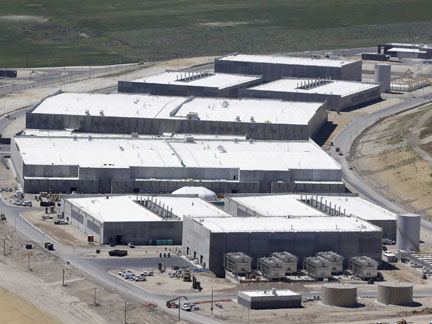
Big Brother violating the Constitution again…
The new government data center in Bluffdale is causing many Utahns to question the government’s right to survey their privacy. Big Brother has been asking technology giants such as Verizon to hand over private customer information. As alarming as these examples seem, these kind of acts are nothing new or uncommon.
Local service provider, Xmission, has refused to give into unwarranted government demands. “The new data center is an enormous violation of the Constitution and a waste of billions of taxpayer dollars,” says owner Peter Ashdown.
Founding his company 20 years ago, Ashdown first began receiving such requests from the government in 1997. That number has increased steadily in the last 15 years. “Ninety five percent of requests are unwarranted,” he adds, meaning that most requests are often out of jurisdiction. Ashdown always makes sure to respond to these demands, with a rejection or compliance, but has never had a single case where, when asked for a warrant, the government has come back with one.
The federal government maintains that the information on the internet is fair game since that’s how the internet was invented, and that this type of surveillance is not a violation if the information is already in the clear.
Ashdown heavily disagrees. He believes this type of information falls under the protection of the Fourth Amendment. “It’s not the way I want to run my business,” he adds, worrying that access to this type of information will lead to an abuse of power. He believes the only way to remedy this is to start using encryption and using smaller, more transparent companies that take their clients’ privacy issues more seriously.
Sadly, most companies don’t put up a fight. Ashdown estimates that 99 percent of all other companies offer the information upon request. While Xmission always complies with legitimate warrants that follow the rules, Ashdown believes that the sole reason the Attorney General’s office has not challenged his refusal to other requests is simply because the office would probably lose its own case and could weaken their ability to gain information from already willing companies.

Ashdown even challenged a bill passed by the AG that functions in case of child protection, which would require an ISP to monitor a client’s internet usage. The issue wasn’t concerning the protection of children, but rather the way the bill was passed and can be presented. “It was passed with no court, with no check or balances,” he says. “Any subpoena can be guised under child protection.”
Ashdown believes the government could spend this multi-billion dollar funding for the data center on better causes, and that the new building stems from our nations “military-industrial complex” and the subcontracts lining the pockets of our congressmen.
The building cost of the data center is estimated to be between $1.2-1.5 billion. This does not include operational costs.
If asked by the government to send information via wholesale taps for his 30,000 clients, in the same way as Verizon, Ashdown says he would refuse. Though he confesses that he hopes jail time is not a serious threat, he says he would serve time over violating his customers’ privacy. Whether or not one agrees with Ashdown, it is clear that governmental surveillance is a reality. §





